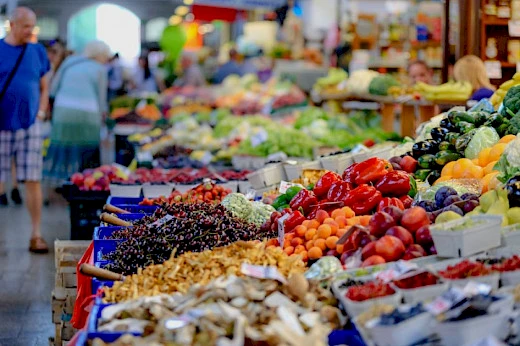Buyers and sellers complain about rising prices at the market in Girne

At Girne’s mid-evening market, both traders and customers are voicing dissatisfaction with the sharp increase in prices. Despite sellers’ efforts to keep goods affordable, residents insist that products have become too expensive. According to the traders themselves, the market is still functioning, but the volume of purchases has noticeably decreased. Both sides expect concrete measures from the authorities to curb inflation.
Sellers’ opinions
Iltifat Baynuroğlu noted that sales cannot be called bad, but buyers are in a difficult situation. Due to changing weather conditions, agricultural production has declined, which caused prices to rise. He stressed that he, too, as a consumer, faces the same difficulties. According to him, with the arrival of autumn and the start of a new production cycle, the situation may improve slightly.
Ali Keskin said that trade is slow: some city residents have gone on vacation, while families face additional expenses due to the start of the school year. He emphasized that fruit and vegetable prices fluctuate sharply: “Sometimes tomatoes cost 15–20 lira, and then suddenly rise to 120.” In his opinion, under such conditions, some sellers think more about profit than about people’s purchasing power.
İsmail Altan added that despite high prices, people continue to come to the market and try to buy only the essentials, even if in smaller quantities. Ergün Kazavanalı also noted that there are complaints from buyers, but trade nevertheless continues.
Nuts and dried fruits have become particularly expensive. According to Kadir Ertürk, these goods have practically turned into luxury items. He explained that wholesale prices for peanuts and pistachios are very high, and even with minimal markup, the final cost becomes unaffordable for most customers.
Buyers’ opinions
Residents of Girne also complain about the high prices. Celal Tunçer stated that prices are comparable to those in the USA or the UK, but the income level in Cyprus is much lower. According to him, sometimes there is a desire to boycott the market, but he realizes that doing it alone will not change the situation.
Cana Tanrıseven said that she is now forced to buy products in “halves” since her income no longer covers previous quantities.
Meri Ch. Bahadi noted that the lack of local production and dependence on external supplies are driving prices up. She gave examples: 100–130 lira per kilo of tomatoes, 100 lira for cucumbers, and 150 lira for beans. In her opinion, until agriculture in the country operates at full capacity, the market loses its purpose, as prices there hardly differ from supermarkets.
Other buyers admitted that they can no longer plan their family budgets: even a standard set of vegetables and fruits is becoming too expensive. Some called the situation “hopeless.”
General conclusions
The market in Girne reflects the broader issue of rapidly rising prices, which affects both producers and consumers. Traders complain about rising costs due to weather conditions, transportation expenses, and more expensive raw materials, while customers note that the market, once considered more affordable, now hardly differs in price from stores.
Both sellers and buyers agree on one thing: the government must intervene. This could include supporting local agricultural production, subsidies, tax incentives, or measures to reduce logistics costs. For now, citizens hope the situation will change, allowing them once again to buy food without excessive spending.
You may also be interested in:
- EMU Becomes a Partner of the Largest Tech Festival TEKNOFEST 2026 in Turkey
- In Lefkoşa, the Millet Camisi mosque is preparing to welcome worshippers for Ramadan
- In Famagusta, a man posing as a minister’s driver fraudulently obtained 1,500 dollars
- Indoor Market and Terminal Opened in Iskele
- Inspections Intensified in Lefkoşa Ahead of Ramadan


